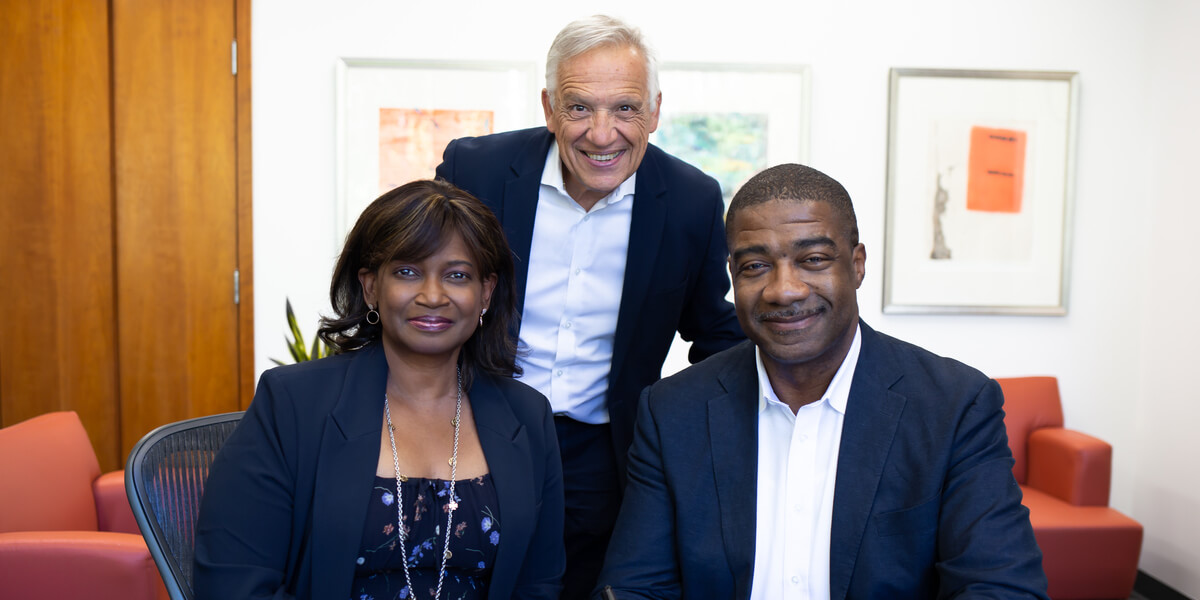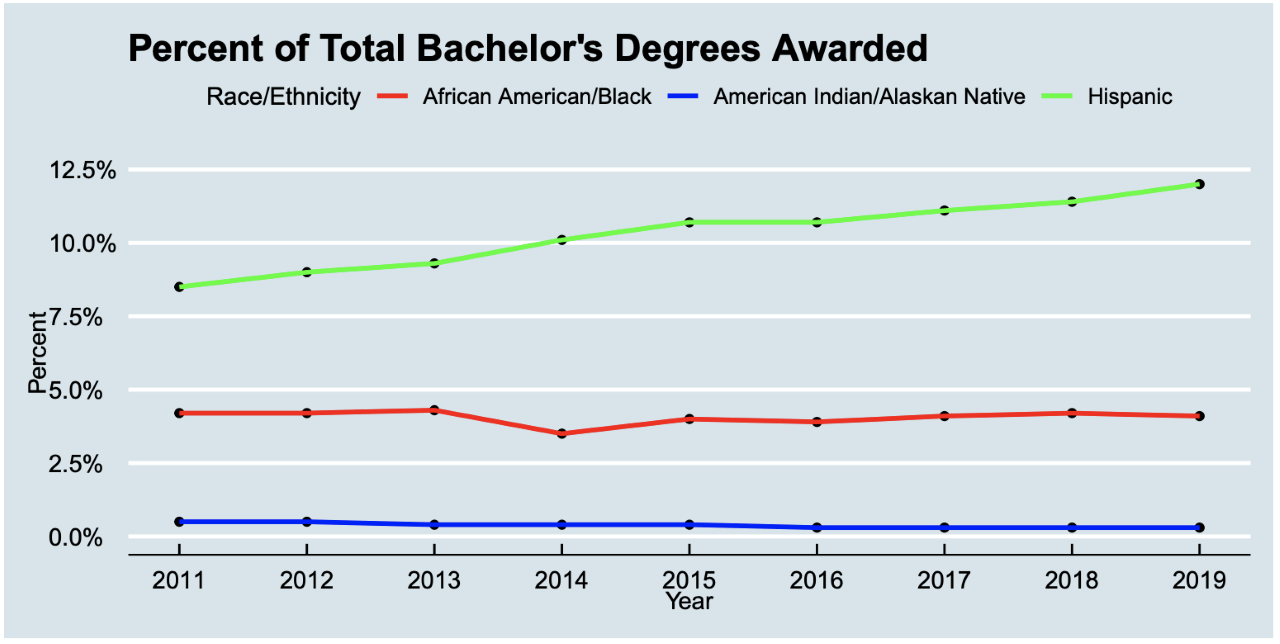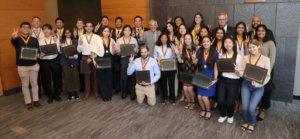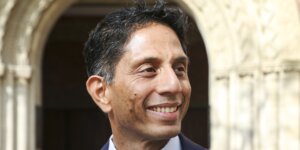
Michele and Al Williams with USC Viterbi Dean Yannis Yortsos
For Al Williams, the words diversity, equity, and inclusion are much more than just catchy corporate buzzwords. The connection is a personal one.
Growing up with 10 siblings in a large family in Jackson, Mississippi — Williams was first introduced to engineering through a diversity, equity, and inclusion program at nearby Mississippi State University.
Fast forward to today, and you’ll find that engineering led Williams down a path of success to a 31-year career at Chevron Corporation where he currently serves as the company’s corporate vice president.
INSPIRING THE NEXT GENERATION OF ENGINEERS
Inspired by the support he received along the way, Al and his wife, Michele who is a pharmacist, are taking action to remove barriers that would prevent students from similar backgrounds from pursuing engineering. In July, the Williams family gave the USC Viterbi School of Engineering an endowed gift that will benefit diversity initiatives like the K-12 Stem Center, the Center for Engineering Diversity, and other programs aimed at enhancing the diversity of the student body at USC Viterbi.
“It’s our way of paying it forward to be able to create more opportunities for more students to be able to pursue their own potential and dreams in engineering,” said Williams, a member of the USC Viterbi School’s Board of Councilors (BOC). “My wife and I are both first-generation college graduates. We hope that we can be an inspiration or beacon of light for individuals to aim high and pursue their aspirations.”
For Williams, the possibilities created by engineering have been beyond the scope of his wildest childhood dreams growing up in Mississippi. Upon receiving an undergraduate degree in electrical engineering from Mississippi State, he began working at Chevron Corporation in 1991 shortly after graduating. Thailand, Indonesia and Australia are just a few of the countries Williams and his family have lived and called home, thanks to his career at Chevron.
“Growing up in the inner city where you never came across an African American engineer, or anyone in that type of profession, I really didn’t have an appreciation for what the opportunities were,” said Williams. “When I take a look at what Viterbi is doing, it’s really creating greater visibility and access to opportunities for kids like I was, which is affording a new generation of underrepresented students the opportunity to excel.”
THE IMPACT
Data from the American Society of Engineering Education (ASEE) shows that from 2011 to 2019, racial minorities in the United States continue to be underrepresented in engineering education. As the image below demonstrates, the percentage of Hispanic graduates has increased from 8.5% in 2011 to 11.9% in 2019 with a steady increase in the intervening years. The percentage of Black graduates, however, has not increased over the same time span with 4.2% in 2011 and 4.3 % in 2019 and no growth upward in the data. There has been a steady decline in the percentage of American Indian/Alaskan Natives from 0.5% in 2011 to 0.3 % in 2019.

Representation in Engineering Bachelor’s Degrees (ASEE 2019)
“The data clearly show the work we have to do. It’s also important to know that here at USC Viterbi, we’re not interested in opportunistic, performative motions on the topic of diversity and inclusion. We know that is the real risk at this time for organizations, universities and schools that are wanting to be accountable and recognizing the urgency of the opportunity that we have right now. And so, we are being thoughtful and listening really hard about the work that we must do together for the outcomes that we aspire to achieve — to increase pipelines and pathways to attract and retain Black, Latinx, and indigenous students and promote an inclusive and equitable environment conducive for all members of the community to thrive and realize their full potential,” said Ken Bonner, USC Viterbi’s associate dean for diversity and inclusion initiatives and chief inclusion and diversity officer.
“The investment of Al and Michele Williams in support of diversity initiatives allows us to strategically influence systemic, sustainable change that requires us to do more than just check boxes. Our goal at USC Viterbi is to do the micro and macro motions every single day that influence our student’s daily experience and changes the system they depend on — systems that drive access and opportunity, culture, and greater equality,” Bonner explained. “I am very thankful that they have invested in such a meaningful and impactful way to make a difference in the lives of our students.”
A RETURN ON INVESTMENT
Creating educational opportunities and increasing pathways to attract groups historically underrepresented in STEM has been a key focus for USC Viterbi dating back decades now.
In 1975, USC Viterbi established the Minority Engineering Program, now the Center for Engineering Diversity. USC thus became the first private university in California to fund a program focused on the recruitment, retention, and graduation of African American, Hispanic, and Native American students. Two years later, in 1977, The USC MESA (Mathematics Engineering, Science Achievement) Program is established; the program is one of the nation’s most successful efforts to encourage K-12 students from underrepresented groups to consider science and technology as career paths.
Recently, in September of 2020 that ongoing commitment was detailed in USC Viterbi’s “Racial-Equity Minded Action” plan, demonstrating the school’s strategic commitment to advance racial equity and inclusion that will help dismantle the structural and systemic barriers that underrepresented groups in STEM face.
“USC Viterbi has been a pioneer in supporting diversity in engineering, through the creation of the Center for Engineering Diversity (CED), which this year celebrates 47 years since its founding, long before the subject received more increased attention,” said Yannis C. Yortsos, dean of the USC Viterbi School of Engineering.
“I am deeply grateful for Al’s commitment to our school as a member of USC Viterbi’s Board of Councilors as well as the entire Williams family’s generosity in supporting diversity, equity and inclusion in this way, especially at this time in history. Al and Michele’s generous support will allow us to change the conversation about engineering and champion environments of support, inclusiveness and wellness, that will help our students thrive and excel, not only in technical competence but also in character.”
Viterbi’s legacy of inclusion and its focus on making STEM careers achievable for students of all backgrounds, motivated Al Williams to donate his money and time to USC. As a leader in a Fortune 500 company like Chevron, making smart investments has been pivotal to Williams’ success throughout his career. He says this investment in USC Viterbi is one that he knows will produce exceptional returns in the future.
“When you invest your time and you go do something in your community, you’re doing it for the greater good of those around you, and that’s what Michele and I see with what we are doing here,” Williams explained. “It’s our way of paying it forward for the greater good of the next generation.”
Published on September 15th, 2022
Last updated on September 29th, 2022













